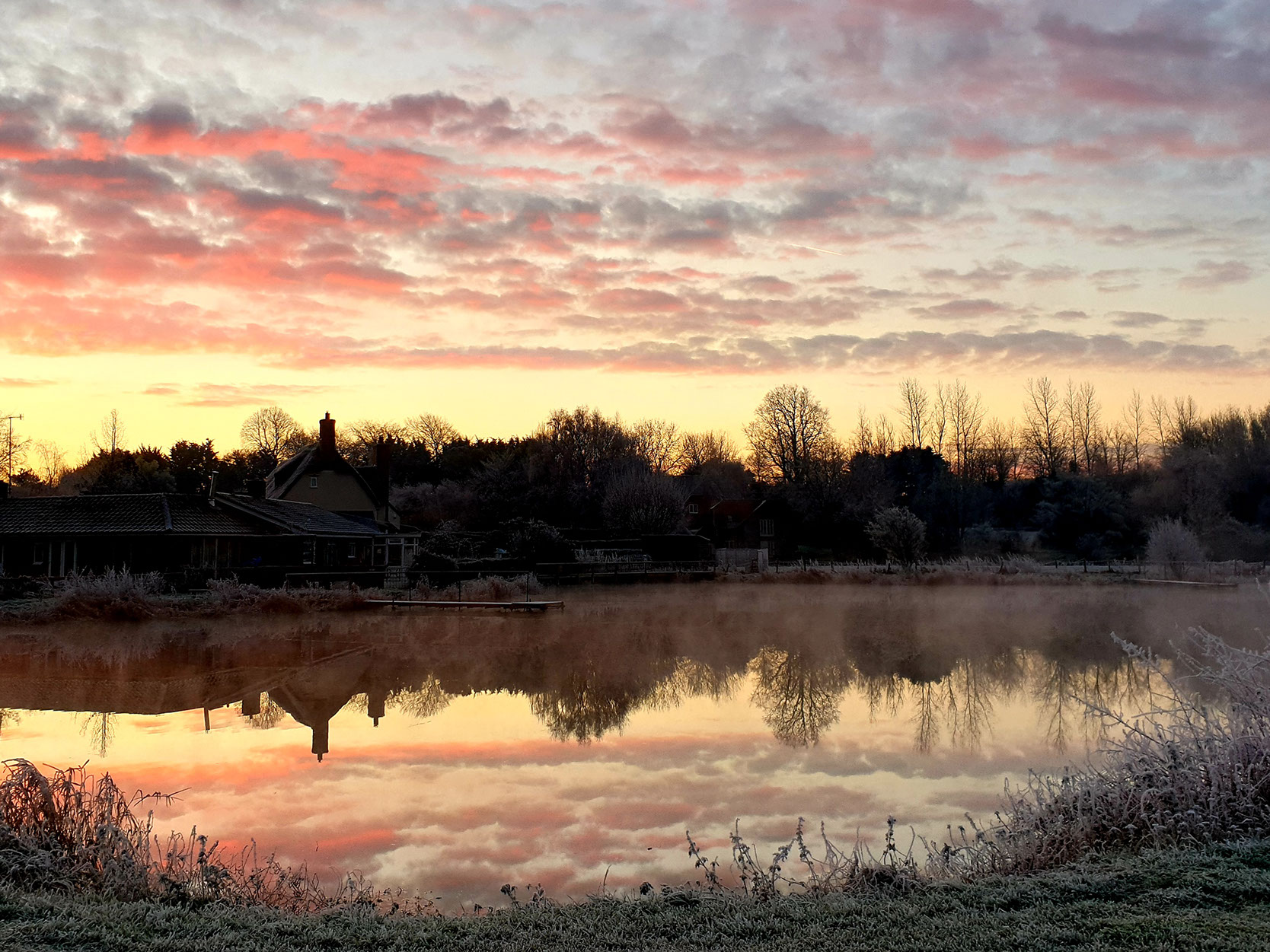December 2023
By Mike Hirsh, Club Chairman
How is your club?
The short answer is that is well and thriving and the price of memberships will be held for a further twelve months.
At the end of last year and the beginning of this year, and as you might expect, I was worried that with inflation, the increased costs of borrowing and the rise in fuel prices there would be members and indeed other anglers too, giving up fishing for a while and re-prioritising finances. There were, however, others on the Club Committee who provided a counterbalance. They made the point that our Club is good value for money and given the importance of being out of doors and the positive impact fishing can have to general well-being, the Club would still attract members.
Whilst I am sure some anglers have had to stop or fish less; I am delighted to report that in terms of the Club’s membership numbers it is again over 800 for the year. Importantly for the future of angling 176 of those are either Juniors or Minors.
The Club’s business plan for 2023 did ensure that, in any event, we could guarantee financial stability for at least twelve months at any time (in accordance with the Club’s constitution) and, as we approach the end of the Club’s financial year, that position can be rolled forwards without difficulty. In the last year the Club’s Officers have spent where expenditure was necessary or would have the greatest value for money.
2023 started with cold and rain, which is after all what you might expect, but this did not help those wanting to fish. Indeed, there were mornings in January and February that were just miserable. I was at Wellington one day, just after dawn, and I watched the lake slowly freeze over. In seventy years of being by waters I have never been by a lake as it froze – and it turned a pretty raw few hours into a truly memorable event. I was not there to fish, but to scare off cormorants and interestingly the birds must have known it was going to freeze, as none showed up to fish.
Compared with last year, when we had two heat waves and drought conditions, this year has been cooler and wetter. We had unusually high rainfall in July which was 230% of the long-term average for the south-west and it has been a wet Autumn too. In consequence the aquifer has been filling early. Over the twelve months November 2022 to October 2023 the south-west has had 130% of the long-term average rainfall at 1329mm. Last year the Club re-built 40 metres of the west bank of the lake at Winterborne Zelston in August and this year it could not have been done due to the lake’s water level never sinking low enough to expose the shore! It also meant the lake has had trout in good numbers stocked throughout the year.
One of the continuing conundrums of helping to manage an angling club is trying to figure out how good catches might be – anglers are a secretive bunch! This las year, I believe catches have been good on most waters. Kingsbridge has consistently been producing some excellent fish, including some good tench as well as carp. However, the best carp of the year I know about was a mirror carp of 36lbs caught by Rhys Philips on the 17 June from Alder Hills – this fish broke the Club’s mirror carp record which had stood for 34 years. Club bailiff Keith had some cracking perch from Creekmoor and, indeed large perch have come from other waters, including the Club’s stretches on the River Stour. Perch, as we know, are fish of cycles but they do seem to be about at present. There is something special about a big perch.
The rainfall and slightly lower temperatures this year had its downside. It meant grass and weeds grew faster and it seemed to me they never stopped. The weather also led to prolific weed growth in our lakes and the River too. The trout fisheries of Rawlsbury and Winterborne Zelston grew water weeds so fast you could watch them grow. Without the help of some key volunteers these lakes would have been overwhelmed. As it was Paul Baker, your Game Secretary, aided by Bob Spurgeon managed to motivate sufficient volunteers to keep the lakes open and fishable. This Autumn there have been a number of ‘doubles’ caught from Winterborne Zelston. None more deserved than a fish weighing 13lbs 14oz which was caught by working party regular Johnny.
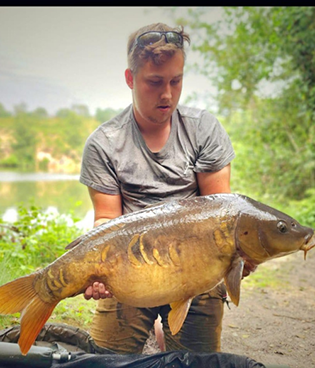
Rhys with his Mirror Carp of 36lbs
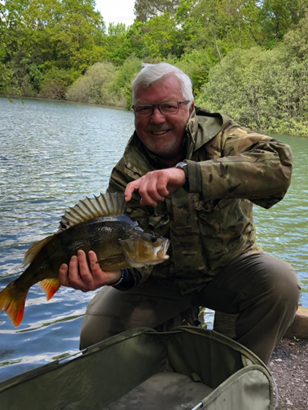
Keith with a terrific perch
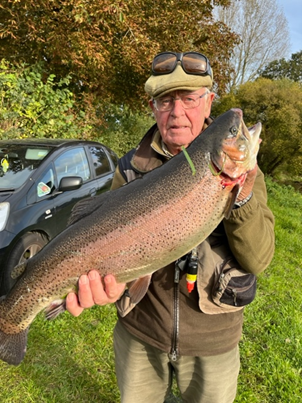
Johnny with his double
Paul and I went to the funeral of Hans Hoff in the first week of October. Hans was an absolute genius when it came to the rearing of trout and his superb fish have been stocked in the Club’s waters for some years. He was one of those people who knew lots about everything and was always right! But his experience with trout and also Arctic char was extraordinary. His knowledge and skill will be a real loss across the trout farming community, and I will miss our bankside discussions -setting the world to rights.
I am positive about the Club’s future. There are plans for some improvements to existing waters and we are likely to top up some fish stocks too in 2024, although in general our fish stocks are good. Do not forget this is your Club, it is not a commercial fishery, so do come to the AGM and if you want to help in some way please let me or others on the Committee know.
My New Year’s resolution for 2024 will be to go fishing more often!
By Mike Hirsh, Club Chairman
The Club needs you!! A post to help the Treasurer
This year George Frost agreed to work a job-share with Sean Harris in the role of Welfare Officer. George has already been on the Committee a while and has a good understanding of what needs to be done. It is still early days, and I am hopeful this will be a useful way of managing this area of work.
Our Treasurer, Jan Nightingale, is intending to move some distance away from the local area sometime in 2024 but would like to continue providing the financial service to the Club.
At present Jan has the Treasurer’s job absolutely nailed down. Jan has her accounting work on spreadsheets, banks largely electronically, and then attends the Committee once a month. At Committee Jan explains her report to the members, but also is able deal with the odd expenses payment at the end of the meeting, if required to do so.
Jan can continue to do most of her work remotely and that is what Jan has said she will do. However, it makes sense to introduce a new member to the Committee to be Jan’s assistant and to act as her personal representative in her absence. This new role will also be the financial ‘eyes and ears’ in relation to some negotiations on rent renewals and similar matters, where I and other Club officers are also likely to be involved. The person concerned will in addition collect payments made in Conyers in Blandford for Club memberships and tickets and will help with the Club’s equipment register.
The Treasurer’s post does not involve handling the individual membership renewals and application monies, as that falls to the Membership Secretary. So, Jan’s electronic banking work for the Club is related to routine payments of rents etc., paying expenses incurred by others in relation to work done, and overseeing the contract for the WC cleaning. The presentation of the monthly financial report is quite straightforward, but it would be preferable if somebody could do it if Jan is not there (I can usually help too in this respect).
If you have spreadsheet skills, and/or an understanding of keeping accounts and are free on the first Tuesday evening of the month to attend the Club’s Committee, then Jan and I would like to meet you to discuss you taking on parts of the current Treasurer’s role. After a year you would be entitled to free Club membership and of course the Club will pay your essential expenses. It will readily suit somebody who has run their own business, or has been involved in accountancy in some way, or is simply good with spreadsheets.
There is a full job description available for the existing Treasurer’s post, which I can send out. If you are interested, please contact me on my mobile (07802418652)
By Mike Hirsh, Club Chairman
No keepnets on Club waters
Following a decision made at the AGM, in the May 2023 newsletter members were advised about the change in Club rules (Rule 5 of the General Rules of Fishing), that will now prevent the use of keepnets on all Club waters. The only exception will be those used during Club-recognised matches.
The ban will come into effect from the 1 January 2024. The Club’s officers and those members attending the AGM accepted there should be a lead time to this rule change and it is hoped all members are now attuned to it.
More generally, it is important that we continue to treat our fish with the care they deserve and to minimise the likelihood of disease transmission, so leave your keepnets at home. Remember to CHECK, CLEAN, DRY all your other tackle too.
Thank you in anticipation of your co-operation.
By Mike Hirsh, Club Chairman
Dates for your diary 2024
12 March 2024 Game Section Annual Meeting at Corfe Mullen British Legion start 19.30.
26 March 2024 WDAC Annual General Meeting at Corfe Mullen British Legion start 19.30.
NB: You will need to produce a current Club membership book to attend.
Trout Anglers please note Rawlsbury will be closed on Saturday the 9th March 2024 for a match on Chapmans and Cowleaze.
A full list of the Club’s coarse matches will be in next year’s membership book but will also be published on the Club’s Website under the Match Section and will be available on the noticeboard at Kingsbridge. NB please check the dates of matches to avoid disappointment because Packhorse may be closed to ordinary leisure fishing and the same applies to Baileys for the winter River matches.
By Mike Hirsh, Club Chairman
Cormorant reporting
In early November the Club’s Area Management Licence to control cormorants was received. This was in response to an application made to Natural England, earlier in the year, as cormorants are protected under the Wildlife and Countryside Act 1981. The licence allows those persons specified in it to shoot a limited number of birds in addition to scaring them off. The licence expires in mid-April.
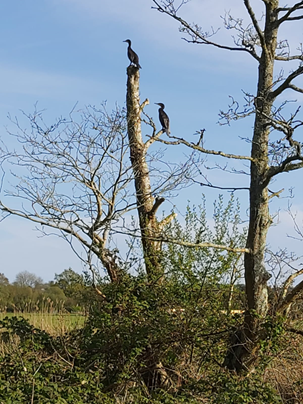
As many of you will know each winter around 20,00 foreign cormorants arrive and fish on our inland waters to add to the resident population. It is why you will see many more in the wintertime.
Critical to the successful submssion of the licence application is the counting of the birds on the Club’s waters. On the Club’s website, on the main menu you will find ‘Cormorant Watch’ and this will take you to a dedicated page where there is an article and some videos further explaining the problem. There is also a simple to use place to log your sightings.
Please scare off any cormorants you see, using whatever tactics are available to you. Waving your arms and shouting abuse are good! Using flashing umbrellas or a rattle or something else that makes a noise will also get them to move. It is important to then log the event using the form to log sightings. It is also important just to log sightings in any event. That electonic response goes automatically to the Club Secretary and then I get the information forwarded to me to analyse and use.
Avian Flu does not seem to have had a noticeable impact on cormorant numbers, and this Autumn/Winter the birds have definitely been around as sightings have already been logged.
In addtion to the data being used for the 2024 renewal application it is also important to receive up-to-date information to enable the shooting licencees to know where there have been recent sightings. The birds are difficult to shoot and quite often the best thing to do from a shooter’s perspective is to to shoot for a close miss. The birds will be deterred if there is regular disturbance.
So please remember to log the sightings. I know it may be a bit of a chore, but it is really quite quick and, after all, it will help protect the Club’s fishstocks.
By Mike Hirsh, Club Chairman
Five men with a bucket
In the last year, hardly a week has gone by without the pollution of our rivers, waterways and beaches being in the news. Anglers across the country have been putting themselves in the front line expressing the outrage felt about the damage to some of the Country’s most iconic waters.
Anglers, however, are just one of the interested parties, infuriated by the inability of the water companies to satisfactorily prevent raw sewage from spilling out of sewage treatment works and properly treat sewage to neutralize potentially harmful chemicals and matter that has got into the sewage system. Equally, there is the continuing idiocy of the farming industry being allowed to continue to operate practices that lead to unacceptable amounts of nutrients running off farmland into watercourses. We watch on as the intensive farming of chickens is leading to phosphorus rich run-off killing the River Wye, whilst those who should have prevented this crisis show sloping shoulders and offer excuses. Whilst wild swimmers, paddleboarders and canoeists can be a pain, when it comes to this this cause, we are all with one voice.
The Club has been monitoring its still waters for some time. There is a degree of self-interest in this as without base line data, it would be more difficult in a pollution or fish kill event to identify obvious changes in the water’s health. Our records also show that even water that is healthy and largely pollution free does change over time. Part of water management is also to monitor our interference with it, so taking samples after major weed cuts and simply taking temperatures and dissolved oxygen levels all help better understand what is happening in a water environment.
The Club, as you will know, is a member of the Angling Trust. The Water Quality Monitoring Network (WQMN) has rapidly become a key part of the Angling Trust’s Anglers Against Pollution campaign. The WQMN started in 2022 with a pilot on the Severn catchment spurred on by the Wye crisis. This project now involves over 620 volunteers from 235 clubs testing water quality on 175 rivers throughout England and Wales, and earlier this year WDAC became one of those Clubs. The WQMN primarily records phosphate and nitrate levels and aims to engage anglers and angling clubs in better understanding pollution issues on their waters. The data can then help support the voices of those campaigning for delivery of local solutions that restore rivers to a healthy state. It is public science providing findings that will help the Angling Trust hold the government to account, but in some extreme situations has already been used by anglers to force action against the worst polluters.
Locally the Club is monitoring, monthly, the water immediately upstream of the Wimborne Sewage treatment works outfall and then on a second site about 170 metres downstream below the A31 road bridge on the bank of the public open space. The objective is in part to monitor the water quality generally, but also to see what impact the Wimborne works are having locally. The Club has purchased a smart testing kit from the Angling Trust which has been subsidised by Orvis.
One of the bye-products of the testing is that Martin is now in touch with the lead officer in Ringwood and District AA involved in testing and dealing with data for Throop. I have also forwarded data to the Dorset Wildlife Trust and received information on this year’s local River fly hatch in return. It is all helping to build a picture about the health of our River. This will hopefully be useful to steer the community on such matters as the Stour Valley Park in relation to the Councils’ objectives about improving the River’s biodiversity.
I have also been in touch with the local EA team at Blandford to let them know about the monitoring and open the discussion in the context of the Water Framework Directive.
Whilst it is too early to be evidentially bomb proof about the information being gathered, you will see from the readings below that the level of nitrate and phosphate is significantly higher than it should be.
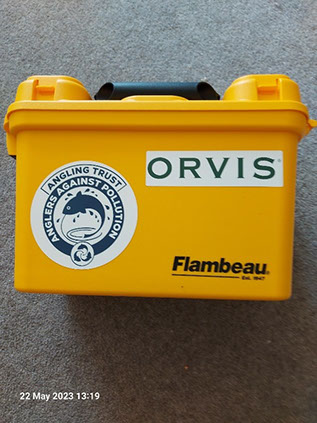
However, the five of us involved in testing are relying on a transparent crabbing bucket and some string to attach to a long landing net pole to take the samples. The bucket is certainly not hi-tech but does the job and our presence on the bank has certainly sparked some interesting conversations. We have had positive responses to our work from all sorts of members of the public and it is surprising how many did not know where the sewage treatment outfall is.
A phone app has been downloaded at the request of the Angling Trust to make the data returns. Martin Dunn, the Club Secretary who is the lead officer on this exercise, can input the data as soon as the tests are completed at each site and then upload it straight to the Angling Trust. The software reads the phone’s position too, so we just have to remember to upload the data where the samples are taken – no use giving a geo reference for Martin’s house!
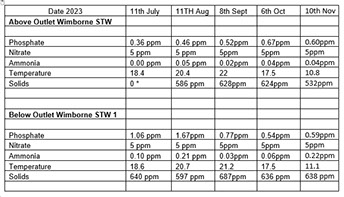
WDAC Readings River Stour 2023
Phosphate good reading = 0.077 >0.306 ppm
Nitrate good reading = 0.75 >1.5ppm
Ammonia good reading = 0.3 > 0.6ppm
* error learning on the job!
This of course is a part of a wider pattern being found in many of this Country’s rivers, so our findings are not surprising. Indeed, we know that some of the Nation’s best loved rivers are in a much worse state.
On a related theme, Brian Heap, who is one the sampling team has become a Water Guardian through the Dorset Wildlife Trust, who is working in partnership on this initiative with Wessex Water. His article explaining the role is below.
By Brian Heap, Club President
Water guardians community project … or… the proactive monitoring of waterways
The Dorset Water Guardians are organised by DORSET WILDLIFE TRUST and funded by WESSEX WATER as a joint scheme to develop cleaner rivers and better habitats for wildlife.
Rainfall in Dorset drains away to the sea through 3 rivers, the Stour, Piddle and Frome and the Wildlife Trust advertised saying it was keen to hear from people living close to these waterways who cared about their local river to get in touch, so I did.
Everyone knows more homes mean more people and more waste, but more bills mean more income for the water authority and Wessex Water knows it needs to upgrade its water recycling centres. We are told treated water entering our river system is, ‘Reasonably Clean’ or ‘Safe Enough’ but perhaps not clean enough to drink or safe enough to swim in unless there are signs declaring a bathing area. When there is heavy rainfall, some treatment works just can’t cope so untreated water enters the rivers but lots more money is needed to fix the problem.
The Water Guardians responsibilities are simply to identify pollution, so as I walk the river paths, I will report sightings of dead or distressed fish, toilet waste, cloudy water, soap suds or foam, grey frothy fungus on the riverbed, foul smelling water, oily sheens or smothering algae. I also pick up litter, not the 4 car tyres on the verge at Canford School but the usual stuff, plastic bottles, beer cans and sweet wrappers, I draw the line at picking up the little green or black plastic bags often seen hanging in tree branches and left as a visible protest against the shortage of conveniently located dog waste wheelie bins. Thankfully, since becoming a Guardian, I have never had cause to report a pollution incident.
The Guardians scheme has been running for just over a year now, there are over 70 volunteers spread across Dorset, more in the Somerset and in the Bristol area. My ‘patch’ is the southern bank on the Stour from Canford School to through to Pamphill and locally there are six other Guardians who cover other parts of the Stour and the River Allen. The Guardians are unmissable in their bright green tabards emblazoned with the Water Guardians logo so if you do happen to meet one, please say hello and give them my regards.
If you wish to report a pollution incident the all-important number is in your membership book, call the EA on 0800 807060.
By Mike Hirsh, Club Chairman and Dan Martin, MTSFC
Request for help from the Dorset Branch of MTSFC
At the August Committee it was agreed that the Club would publish the following request from Dan Martin, the Dorset Branch Secretary of MTSFC. He is aware that it would simply be published at the first opportunity. If you wish to become involved in helping special needs school children to fish with this organisation, please contact Dan Martin direct using the contact details at the end of this item (which is different from his article):
I am writing today as the Secretary for a local fishing charity MTSFC. (Dorset Branch) Our aim is solely to take children from local special needs schools and give them a half day’s coarse fishing experience by a local lake free of charge. After which we have a BBQ, present medals, and certificates of achievement, before sending them back to school for around 2.30pm. Of course, all castors are treated to a bacon and egg roll for breakfast and sausage and burger for lunch (veggie available) and all stand a chance to win a bottle of tipple at the end.
We offer free DBS checks for anyone seriously wishing to volunteer a few hours, just a few times per year, to give the children an unforgettable experience which really does enrich their lives.
We are fully licensed and insured for all eventualities through the Central MTSFC charity. Reg. Charity No. 1141630.
We have been doing this for 11 years here in Dorset although the charity has been running nationally for 20 years with many successful events. For us to be able to do what “we do” we must operate 12 DBS checked fishermen per event, and currently operate 2 events per year. We usually have on site a level 2 coach, so qualifications aren’t essential, only DBS certificates are a must. The children will only be fishing at a very basic level so technical and specimen experience also isn’t essential. It’s more important that you can fish, have some gear, and want to support our charity with your time.
What we do ask
You must be over 18. We ask all Anglers to bring a spare chair for their paired child to sit on at the lakeside, and some kit for the child to use as we only have very basic poles (whips). All bait for the day will be supplied by us.
We are on a drive now to increase and refresh our pool of castors. So get involved with this exciting and rewarding opportunity.
A typical event runs somewhere along the following lines:
● Arrive at venue for 08:00, for a bacon and egg sandwich and a safety briefing.
● Set up around the lake ● 09:00 - 09:30 children arrive and are safety briefed
● Children paired up with an angler
● Children fish till around 12:30-13:00.
● BBQ sausages and burgers (veggie option)
● 13:00 - 14:00 presentation of medals and certificates for the children
● 14:00-14:30 send the children back to school
● 14:30 we usually hold a free raffle for a bottle of tipple between the anglers
We would be extremely grateful if you are able to circulate this through to your membership, who may be keen to take us up on this very rewarding opportunity.
Ideally we would be grateful if you could co-ordinate a list of names from your membership and contact email/tel numbers for us to contact. Each of whom we will arrange DBS certificates to either be logged or carried out.
The feedback we receive from our previous castors is: that “its very enjoyable and rewarding day for all involved, free breakfast sandwich, free BBQ lunch, and the chance to fish on lakes not usually in your repertoire.”
And of course, you stand to win a bottle of tipple.
We are hoping to run an event around the end of September/early October, and with DBS taking up to 6 weeks, we would need to put a soft deadline on any returns by your club, ideally by the end of this month (July 2023) giving us enough time to DBS any of your interested members before an autumn event. Of course, any latecomers or additions will also be welcomed but may not be in time for events this year in favour of our 2024 events.
Of course, any of your members are more than welcome to encourage friends/family into the programme, so long as they can fish and are willing to complete DBS with us.
If any of your members wish to contact me directly, they are more than welcome to do so to join the dedicated pool of castors or ask for more information.
Feel free to share this mail with anyone else you may feel might be interested in volunteering their experience for the benefit of some very deserving young children.
My contact details are: Dan Martin, MTSFC reg No.1141630 (Dorset Branch Sec)
Email : Danmartin622@gmail.com
Tel : 07513532030
I look forward to hearing from you soon.
Kind regards
Dan Martin MTSFC (Dorset Branch) Sec
Thoughts on groundbait
Occasionally I look back through the fishing books that have come my way over the years, they sit on a shelf in the corner of my dining room and I can’t bear to part with any of them. Many of these books are, ‘old’ now and the information they contain has been superseded by modern methods and by lighter and cheaper tackle. Bread, worms and maggots have of course remained unchanged, and I guess fish are no more intelligent now than they were when these books were written so perhaps some of the information they contain is still good, perhaps not.
Encouraging fish to feed then keeping them interested without overfeeding them has always been a personal challenge of mine so on picking up a new fishing book I turn to any information on ground baiting techniques first. And now as I page through an old match fishing book I see the advice then was to buy a hundredweight (50 kilos) sack of breadcrumbs for 4 pounds and 5 shillings, this to last a whole season. To prepare the ground bait for fishing the advice was to mix it with milk the night before the match using a bucket and a large spoon. Heavier ground bait required for deep water and fast flowing rivers could be made by adding mashed potato to sausage rusk in the ratio of 3 to 1, the same mix as for strong concrete. It was recommended that the mashed potato should be cooked and mixed on the morning of the match so, a nice early start was needed to peel the spuds and get things ready. Certain venues required up to twenty pounds of pre mixed ground bait for a match and this was transported in tins and carried in a fishing basket strapped over one shoulder, no trollies about then.
Practice makes perfect, so accurate throwing was thought essential this to direct and present the bait to the correct spot each time. Method feeders and pole pots were not by then commercially available but, it wouldn’t surprise me if early prototypes were being developed. To improve throwing skills the advice was to position a bowl of water at one end of the garden path and sit on your basket at the other end then proceed to throw balls of ground bait at the bowl. The reasoning was, the more accurate you were, the greater the concentration of fish around your hook. Setting the bowl into the garden path as a permanent fixture was also recommend for anglers seeking regular throwing practice. The holding of the rod in one hand whilst throwing with your free hand was thought essential to the learning experience but anyone following this advice today should perhaps have a word with the neighbours first so as not to attract too much attention or cause alarm. At the waterside regular feeding was the key to success and as one ball every minute was thought correct and hanging a wristwatch at eye level in front of you whilst watching the second hand sweep round was suggested to improve your timing. After several hours the wristwatch could be dispensed with in favour of the natural rhythm that would have by then developed.
Has fishing changed much in the last 70 years, perhaps not that much really, cereal based ground baits are still widely used nowadays but they available in smaller bags and pure brown breadcrumbs take some beating on the river in winter. Secrecy has always surrounded ground bait recipes and it is a matter of personal choice whether we go home after a day fishing smelling of strawberry, chocolate or fishmeal. After trying different brands, we tend to settle on our favourite, this decision often being made on the assumption that if it worked once it will work again regardless of where we are and which species we are targeting. Can fish be tempted by a flavoured morsel when they reject a plain one; do fish prefer strawberry one day and chocolate the next; do the flavours catch the more fishers than fish. Over to you and finally yes, proper preparation prevents a poor performance and as for practice, well we could all be world champions if we practiced every day, couldn’t we.
By Brian Heap, Club President
NEWS BY MONTH
DECEMBER 2025 NEWS
MAY 2025 NEWS
FEBRUARY 2025 NEWS AGM
DECEMBER 2024 NEWS
MAY 2024 NEWS
MARCH 2024 NEWS AGM
DECEMBER 2023 NEWS
MAY 2023 NEWS
MARCH 2023 NEWS AGM
FEBRUARY 2023 NEWS
DECEMBER 2022 NEWS
SOCIAL AND CONTACT
SUBSCRIBE TO OUR NEWSLETTER


TERMS AND CONDITIONS
COPYRIGHT WDAC 2024
